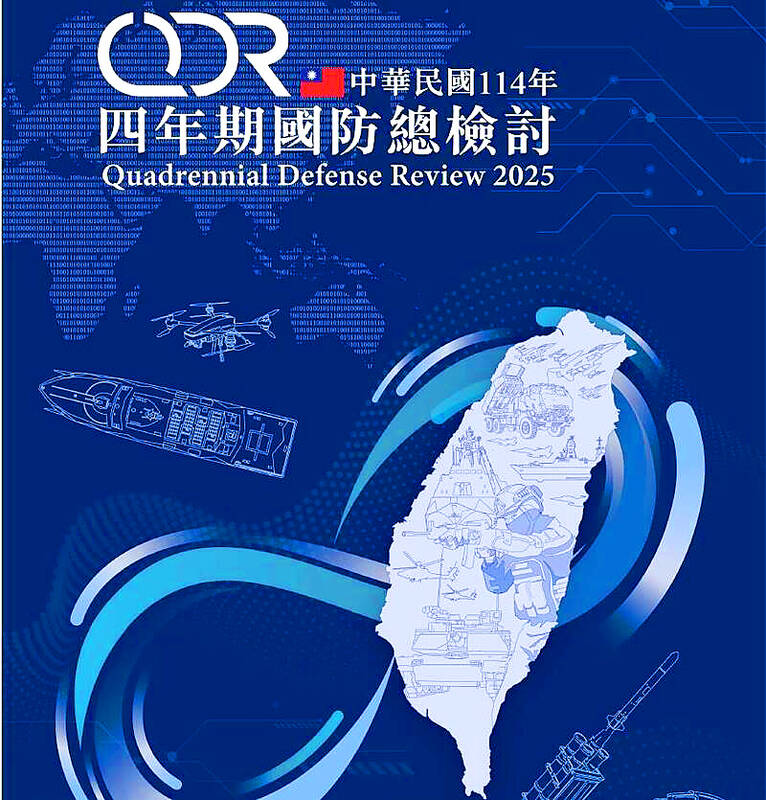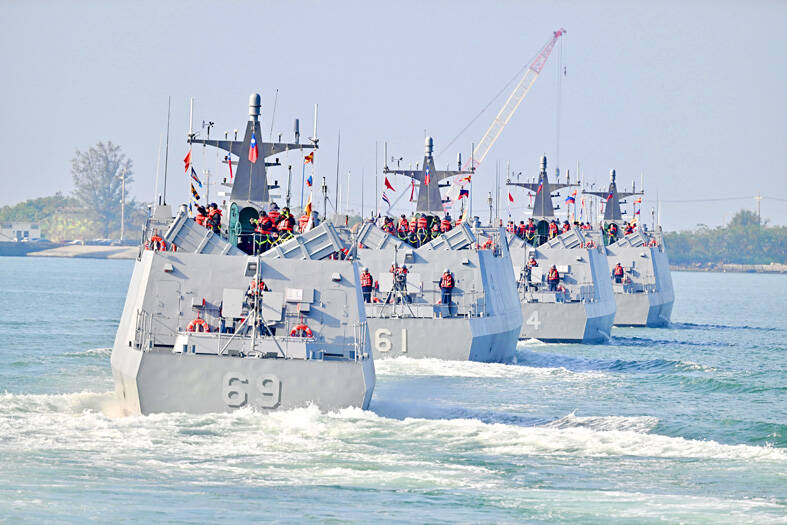The Ministry of National Defense yesterday delivered its Quadrennial Defense Review (QDR) to lawmakers, highlighting the nation’s defense strategy and elaborating on the role of US military cooperation.
Per Article 31 of the National Defense Act (國防法), the ministry must submit the QDR to the Legislative Yuan within 10 months of the presidential inauguration.
Like the 2021 QDR, the new quadrennial report focuses on building strong defenses and multilayered deterrence.

.Photo: Screen grab from the Ministry of National Defense’s Web site
The strategy would take advantage of Taiwan’s terrain to bolster the military’s “adaptability, agility, lethality, cost-effectiveness and stealth,” the QDR said.
The nation would build combat capability across land, sea, air and cyberspace to deter aggression, the QDR said.
During wartime, the ministry would rapidly mobilize, enact multiple layers of defense and lean on military-civilian integration to delay enemy actions, weaken any invading forces and force a retreat, it said.

Photo: Tu Chien-jung, Taipei Times
Future budget increases would focus on enhancing asymmetric capabilities and strengthening countermeasures to “gray zone” threats, the QDR said.
To raise the total defense budget to President William Lai’s (賴清德) target of more than 3 percent of GDP, the ministry would prioritize a special defense budget, it added.
The latest report included a separate chapter dedicated to “linking regionally to strengthen collective deterrence,” with the chapter’s first section dedicated to “deepening military exchanges between Taiwan and the US.”
The US is an important strategic partner, engages in close military exchanges and assists the nation in developing its self-defense capabilities, it said.
The ministry will continue to promote strategic cooperation with the US to maintain peace and stability in the Taiwan Strait, it added.
As for cooperation plans, the ministry would expand and deepen cooperation through strategic national security dialogues and visits, joint military exercises, defense industry cooperation and intelligence sharing, it said.
In other developments, the ministry yesterday confirmed that this year’s three-phase Han Kuang exercises began last month, with phases two and three to take place next month and in July.
According to a ministry report delivered to the legislature’s Foreign Affairs and National Defense Committee, this year’s drills would be focused on China’s “gray zone” tactics and the possibility of a Chinese invasion in 2027.
Military officers held a closed-door sandbox simulation last month, in which the joint chiefs of staff and other high-ranking military personnel reviewed this year’s joint combat plans, which have been amended based on changes made to counter information warfare, to include the whole-of-society defense resilience concept, and the issue of reservist forces, the report said.
The next session, which is to run from April 5 to 18, would use the Joint Theater Level Simulation systems to help commanders across all levels to test the validity of their plans and strategies, and how to work better with their own staff, it said.
The final results of the second stage are to be implemented in the live exercises from July 7 to 18, with all commanding officers encouraged to develop strategies that consider possible actions from enemy forces, it said.
The exercises, at different stages, expect to set the rules of engagement, implement decentralization of command, review weapon and equipment efficacy in combat situations, general logistics support, and how well the military and civilian sectors are integrated, it said.
The exercises hope to address strategies involving joint task force efforts to lock down enemy forces, implement defensive mine-laying, spread out munition supplies and logistics, test the efficacy of newly acquired weapons, and gauge how well civilian and military arms integrate with each other, the report said.

The Ministry of Foreign Affairs (MOFA) yesterday said it is closely monitoring developments in Venezuela, and would continue to cooperate with democratic allies and work together for regional and global security, stability, and prosperity. The remarks came after the US on Saturday launched a series of airstrikes in Venezuela and kidnapped Venezuelan President Nicolas Maduro, who was later flown to New York along with his wife. The pair face US charges related to drug trafficking and alleged cooperation with gangs designated as terrorist organizations. Maduro has denied the allegations. The ministry said that it is closely monitoring the political and economic situation

Conflict with Taiwan could leave China with “massive economic disruption, catastrophic military losses, significant social unrest, and devastating sanctions,” a US think tank said in a report released on Monday. The German Marshall Fund released a report titled If China Attacks Taiwan: The Consequences for China of “Minor Conflict” and “Major War” Scenarios. The report details the “massive” economic, military, social and international costs to China in the event of a minor conflict or major war with Taiwan, estimating that the Chinese People’s Liberation Army (PLA) could sustain losses of more than half of its active-duty ground forces, including 100,000 troops. Understanding Chinese

UNRELENTING: China attempted cyberattacks on Taiwan’s critical infrastructure 2.63 million times per day last year, up from 1.23 million in 2023, the NSB said China’s cyberarmy has long engaged in cyberattacks against Taiwan’s critical infrastructure, employing diverse and evolving tactics, the National Security Bureau (NSB) said yesterday, adding that cyberattacks on critical energy infrastructure last year increased 10-fold compared with the previous year. The NSB yesterday released a report titled Analysis on China’s Cyber Threats to Taiwan’s Critical Infrastructure in 2025, outlining the number of cyberattacks, major tactics and hacker groups. Taiwan’s national intelligence community identified a large number of cybersecurity incidents last year, the bureau said in a statement. China’s cyberarmy last year launched an average of 2.63 million intrusion attempts per day targeting Taiwan’s critical

‘SLICING METHOD’: In the event of a blockade, the China Coast Guard would intercept Taiwanese ships while its navy would seek to deter foreign intervention China’s military drills around Taiwan this week signaled potential strategies to cut the nation off from energy supplies and foreign military assistance, a US think tank report said. The Chinese People’s Liberation Army (PLA) conducted what it called “Justice Mission 2025” exercises from Monday to Tuesday in five maritime zones and airspace around Taiwan, calling them a warning to “Taiwanese independence” forces. In a report released on Wednesday, the Institute for the Study of War said the exercises effectively simulated blocking shipping routes to major port cities, including Kaohsiung, Keelung and Hualien. Taiwan would be highly vulnerable under such a blockade, because it